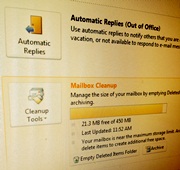28 April 2015
 It’s revolutionised the way the world communicates, boosted networking and collaborative work practice, but in an increasingly mobile, online age - email “overload” is on the rise.
It’s revolutionised the way the world communicates, boosted networking and collaborative work practice, but in an increasingly mobile, online age - email “overload” is on the rise.
Discovering the impact of email in a University setting is the focus of a major research project at the University of South Australia (UniSA) where 471 academic and professional staff have been surveyed about how they use email.
And contrary to making life easier – email is often the cause of frustration and stress.
Most of the respondents expressed concerns over the volume of emails and the expectation of quick responses all the time.
Compared to professional staff, academic staff (comprising 193 respondents) reported higher levels of email overload and a higher number of emails received, sent and read after work and on weekends.
Academic staff are also more likely to restrict email checking to specific times but were less likely to file messages and manage their inboxes effectively.
Professors and Associate Professors reported the highest volume of email traffic (84 emails a day), yet also valued the importance of email the highest.
Research author Dr Silvia Pignata described the study as a “snapshot” of email processes provided during a specific time period, reliant on self-reported estimates of email volume, without regard to IT records.
Dr Pignata says that compared to a US study of managers undertaken in 2006 it appears that university employees are experiencing, or at least perceive, higher levels of email overload than peers in other industries.
“Research indicates that trends have become magnified with the recent advent of smart phone and tablet devices allowing digital work to further intrude into non-work time,” Dr Pignata says.
“Despite email playing a central role in university business, little is known about the strategies used by staff to manage email and the factors contributing to email overload.
“This is not something that is unique to UniSA. We would suggest that email overload typifies the working environment of academic and professional staff in modern universities, pointing to the importance of training staff in email management strategies for improving productivity and wellbeing.”
The infiltration of work email into personal and family life has also been the subject of research undertaken by UniSA’s Centre for Work and Life in 2013. A report by the Centre found that of 792 workers who were surveyed by The Australia Institute, almost half of those who had a mobile device with email access check their work emails once or a few times a day when they are not at work.
Contact for interview: Dr Silvia Pignata office (08) 8302 3823
Media contact: Will Venn office (08) 8302 0096 email will.venn@unisa.edu.au




